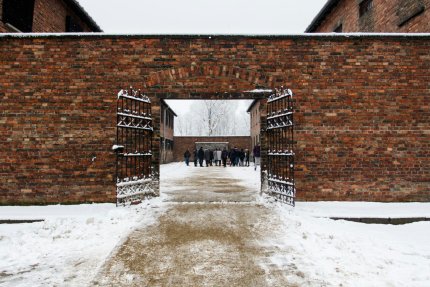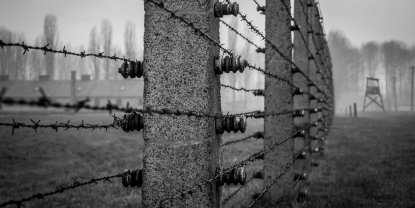Tragic events in history must be remembered at least in order to prevent their repetition. That is why various memorial days are celebrated, even though they are related to things that you don't even want to think about. And on January 27, one of these dates is celebrated - the International Day of Remembrance of the Victims of the Holocaust. And Guide Online will now tell you more about it, its goals and related activities.
History of Holocaust Remembrance Day
On November 1, 2005, the UN General Assembly decided to organize an international day of remembrance for the victims of the Holocaust on January 27. More than 100 countries spoke in favor of this initiative, and Ukraine was among the 6 initiators of this decision. However, despite its role, we officially started celebrating this date a little later - from 2012.
Why exactly January 27? And because it was on this day in 1945 that the troops of the First Ukrainian Front entered Auschwitz-Birkenau, the largest death camp in Eastern Europe. And they found traces of numerous war crimes that the Nazis desperately tried to hide. It didn't work out - there were too many victims and the pedantic Germans kept documentation of their actions too well.
And there were really many victims. It is believed that more than 6 million Jews (1.5 of them from the territory of Ukraine) were destroyed during mass ethnic cleansing. Which at that time constituted about a third of the entire Jewish people. But other nations also suffered from the Holocaust, although they accounted for only 10 percent of the total number of victims.
Why "Holocaust"? From Greek, this word is translated as "complete burning". Perhaps the most vivid description of what the Nazi regime planned to do to anyone who was "wrong" ethnically or otherwise.
The significance of Holocaust Remembrance Day

The main purpose of the International Holocaust Remembrance Day is to honor the Jewish victims of the Nazi regime. However, it also has a wider meaning - honoring the memory of the victims of genocides based on racial and religious grounds in principle. That is, the Holodomor, the genocide of the Kurds, the extermination of ethnic minorities in China, the apartheid policy of South Africa, and much more.
After all, despite the fact that similar violations of basic human rights are repeated in the 21st century, they cannot be ignored. This is the broad meaning of the International Holocaust Remembrance Day.
Related events

Of the numerous events associated with the day of remembrance of the victims of the Holocaust, it is worth highlighting three of the most significant.
UN Resolution 60/7
It, in addition to the official introduction of the day of remembrance of the victims of the Holocaust on January 27, refers to the prohibition of any form of denial or justification of the Holocaust as such. Yes, there are still people who say that: "That's what they had to do. We can repeat." There are especially many of them on various Russian-language nationalist forums, because of course, the Jews are to blame for all the troubles of "great Russia". And from the point of view of international law, all these statements attract the article. But the hands of this right for some reason always turn out to be short when it is really needed.
Resolution 60/7 also aims to develop educational programs designed to convey to people the simple points of the declaration of human rights: no one should be persecuted because of his religious beliefs or ethnicity. Unfortunately, these programs are carried out where everything is fine with an understanding of basic rights, and not where it really should be improved.
Yom HaShoah
In Israel, there is a day of remembrance for the victims of the Holocaust. And it is celebrated on the 27th of the month of Nisan according to their traditional Jewish calendar, so it falls on different days every year. "Shoah" means "catastrophe" in Hebrew. It is this term that the Jews call the Holocaust, because it really became a catastrophe for their entire people, from which they still have not fully recovered.
The main tradition is the ubiquitous air raid sirens, followed by 2 minutes of silence. Transport stops, any activity stops. And, of course, a special service is held in synagogues on this day. This day began to be celebrated quite a long time ago - back in 1951 (and Israel itself was founded only in 1948), so we can already talk about established traditions associated with this event.
And the events after the terrorist attack from the Gaza Strip at the end of 2023 showed that the Jews take the promise of "never again!" very seriously. And they are ready to actually act, not to "express serious concern".
The Day of Remembrance of the Victims of National Socialism
Began to celebrate in united Germany in 1996. On this day, the memory of all victims of Nazism was commemorated, regardless of their ethnicity. Nevertheless, in Germany, they drew the right conclusions from those events, so they are still making every effort to let ordinary people know the truth about them.
The initiative of the German parliament was particularly interesting. On this day, those who personally experienced the horrors of concentration camps are invited to speak there. After all, it is one thing to read impersonal historical summaries, and quite another to see real people who suffered from those events. And it is no longer possible to "depersonalize" the tragedy of millions - it turns into a tragedy of individuals, which is much more difficult to ignore.
Conclusion
The main task of the International Holocaust Remembrance Day is to ensure that those events never happen again. Unfortunately, modern international democratic society has not coped with this task. Simply because, despite historical experience, effective mechanisms of influence on totalitarian regimes have not been acquired. Even on local ones, what to say about those armed with nuclear weapons.
We can only hope that after our inevitable victory, international organizations will be reformed in such a way as to be able to truly never again allow genocide on religious, ethnic or any other basis.

